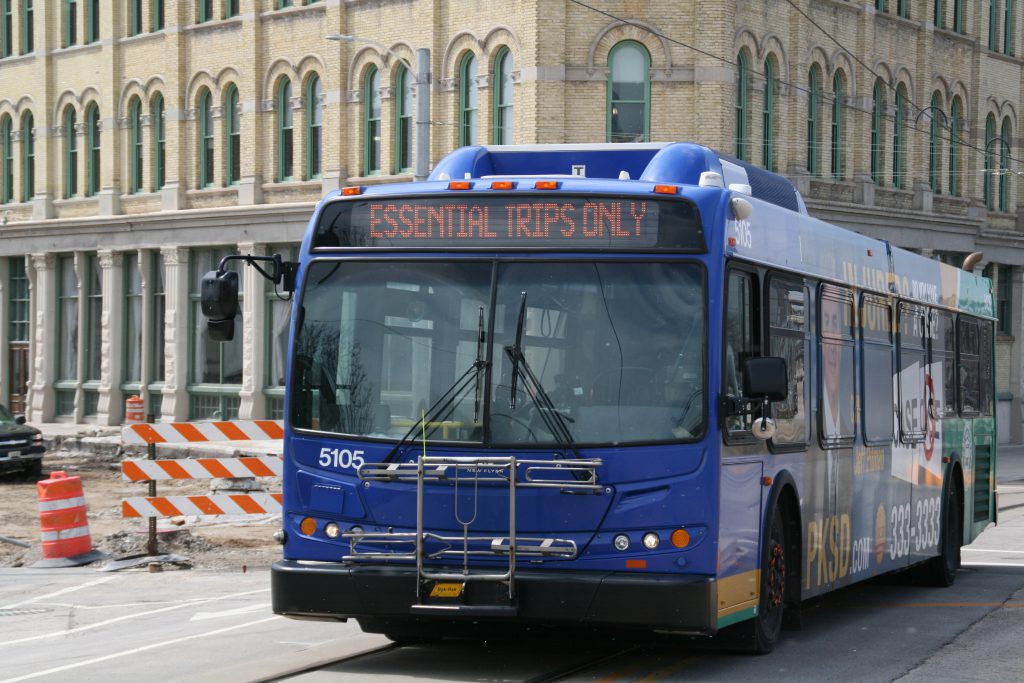County Buses Will Collect Fares Again
Given county fiscal crisis MCTS needs revenue, will begin collecting fares again on June 1st
Beginning June 1st, the Milwaukee County Transit Service (MCTS) will begin collecting bus fares again.
The transit system is going back to fare collection next week because the COVID-19 pandemic and ensueing economic shutdown has created a fiscal crisis for Milwaukee County, requiring it to find revenues wherever possible. In a statement, MCTS said, “Fares are needed given the rising costs and lost revenue resulting from the COVID-19 pandemic.”
Dan Boehm, managing director of MCTS said during a media briefing Tuesday that the system normally collects approximately $2.5 million in fares every month, and in the past 60 days it has lost approximately $1.6 million in revenue. Even before ending collection, fares were dropping at the start of the pandemic as ridership decreased.
“So it’s time to help address this year’s budget and some of the fiscal concerns at Milwaukee County by bringing in some of those revenues,” Boehm said.
County officials estimate that the cost of the pandemic to the entire county government could approach $450 million. Budget projections for 2021 show that county leaders could face an unprecedented budget gap when they begin assembling next year’s budget.
MCTS stopped collecting fares in late March in an attempt to limit interaction between passengers and bus operators. This allowed all passengers to enter through the back doors. The transit system also instituted a limit of 10 riders per bus, which is still in place. But other than the Freeway Flyers, which aren’t running right now, the bus schedule is running just as it was before the pandemic.
Boehm encouraged the use of contactless payment methods for bus fares. Riders can wave their Mcard over farebox to pay, or they can use the MCTS to purchase tickets and simply show the operator their ticket on their phone. He also said it’s important that riders limit interaction and conversation with bus operators as much as possible.
Boehm also encouraged wearing face coverings when riding the bus. Milwaukee County still does not have a mandatory face covering policy. Other transit companies have recently instituted such rules.
Boehm told the transit committee he was leery of a mandatory face covering rule. Not everyone has access to masks, he said, and enforcement of the rule poses significant challenges. The last thing the system wants is “transit security officers dragging somebody out the back door of a bus because they weren’t wearing a mask,” he said, as has happened elsewhere during the pandemic.
If you think stories like this are important, become a member of Urban Milwaukee and help support real, independent journalism. Plus you get some cool added benefits.
MKE County
-
Prosecution Rests Case in Dugan Trial
 Dec 17th, 2025 by Graham Kilmer
Dec 17th, 2025 by Graham Kilmer
-
Chief Judge Questioned About ICE Policy, Texts, Emails in Dugan Trial
 Dec 17th, 2025 by Graham Kilmer
Dec 17th, 2025 by Graham Kilmer
-
Fellow Judge Testifies in Dugan Case
 Dec 16th, 2025 by Graham Kilmer
Dec 16th, 2025 by Graham Kilmer
Transportation
-
Congestion Pricing Cuts Air Pollution in New York City
 Dec 14th, 2025 by Jeff Wood
Dec 14th, 2025 by Jeff Wood
-
FTA Tells Milwaukee to Crack Down on Fare Evasion — Even Where Fares Don’t Exist
 Dec 12th, 2025 by Graham Kilmer
Dec 12th, 2025 by Graham Kilmer
-
Will GOGO’s Bus Service Ever Get Going?
 Dec 9th, 2025 by Jeramey Jannene
Dec 9th, 2025 by Jeramey Jannene






















This would be a good time to phase out cash fares. The standard argument that this might be a hardship to some riders made sense when paper tickets required a minimum purchase of 10 rides (equivalent to $20 in today’s fares). The M-Card only requires a minimum load of $2, and if registered is protected against loss or theft. The administrative fee to acquire an M-Card is recouped after only eight uses.
Other systems around the world have done this, notably London in 2014.
The expense of processing cash and the bus delays associated with cash fare payment are now joined by health safety as reasons to discontinue cash. The smart phone app is also available as an alternative.